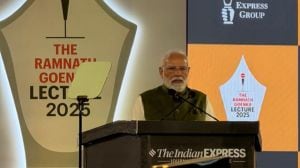US Speaker Pelosi, who slammed China, on her way to meet Dalai Lama
As China comes down strongly on Tibetan protestors in Lhasa in a bid to break the momentum ahead of the Beijing Olympics...

As China comes down strongly on Tibetan protestors in Lhasa in a bid to break the momentum ahead of the Beijing Olympics, US House of Representatives Speaker Nancy Pelosi will be in Dharamsala next Friday to meet the Dalai Lama in a show of solidarity against Chinese action in Tibet.
Pelosi, the third ranking official in the US after the President and Vice-President, is key Democrat leader who was in the forefront of the US Congress decision to award the prestigious Congressional Medal of Honour to the Dalai Lama last October. An upset China had promptly lodged a diplomatic protest.
She issued a strong statement on Wednesday calling upon the Bush Administration to “publicly condemn” Chinese action and issue a “travel warning to Tibet”.
“The violent response by Chinese police forces to peaceful protestors in Tibet is disgraceful…the Chinese government should immediately provide information the welfare and whereabouts of the detained Buddhist monks… there is disturbing new evidence of a pre-Olympic crackdown on religious leaders, journalists and lawyers in recent months. The Olympic Games in Beijing this summer should provide an opportunity for more free expression, not less,” she said.
Concerned over pro-Tibet protests catching momentum ahead of its showcase event — the Beijing Olympics in August — and becoming a source of embarrassment for the Chinese government, Beijing is using all diplomatic muscle to ensure that matters do not get out of hand. In this context, India becomes vital given the large presence of Tibetan refugees and, more importantly, the Dalai Lama.
That Pelosi will be visiting India and meeting the Dalai Lama, sources said, is bound to upset Beijing. Not just that, the US Speaker is also expected to give a statement there and then spend time with Tibetan refugees. It may be noted that some 100 young Tibetans had started a march for Lhasa a few days ago from Dharamsala but were later rounded up by Indian authorities and are now in detention.
India’s actions were a result of frequent reminders from China about New Delhi’s commitment to not allow its territory to be used for political activities against China. In this connection, the Cabinet Secretary reminded all ministers that they should not participate in any political forum by Tibetans against China.
However, New Delhi has allowed Pelosi’s visit to Dharamshala, which is an indication of India’s tight-rope walk on the issue.
Significantly, the US Embassy in Beijing cautioned US citizens to defer travel to Tibet. The advisory confirmed that Americans currently in Tibet have reported “gunfire and other incidents of violence”. In its latest Human Rights report, the State Department too has highlighted the lack of freedom of expression in Tibet but at the same time refrained from listing China as a top human rights violator.
Pelosi, who will be here on March 20 will travel to Dharamsala the next day. She will also hold discussions on the Tibet issue with the Indian political leadership besides other key bilateral issues including the future prospects and time for nuclear deal in the US Congress.
Meanwhile, the Dalai Lama issued a statement today saying he was “deeply concerned over the situation that has been developing in Tibet following peaceful protests in many parts of Tibet, including Lhasa, in recent days. These protests are a manifestation of the deep-rooted resentment of the Tibetan people under the present governance.”
“As I have always said, unity and stability under brute force is at best a temporary solution,” he said. “It is unrealistic to expect unity and stability under such a rule and would therefore not be conducive to finding a peaceful and lasting solution. I therefore appeal to the Chinese leadership to stop using force and address the long-simmering resentment of the Tibetan people through dialogue with the Tibetan people. I also urge my fellow Tibetans not to resort to violence.”



- 01
- 02
- 03
- 04
- 05




























